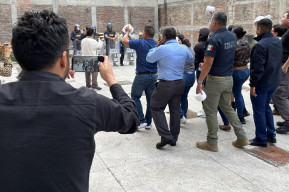News
Transforming cities into welcoming spaces for migrants

The 1st Metropolis Francophonie Mondiale Congress, held from 16 to 17 December 2021, was dedicated to multi-stakeholder dialogue and knowledge-sharing on migration, integration and inclusion. Organized by the Metropolis Institute in Canada with support of UNESCO’s International Coalition of Inclusive and Sustainable Cities – ICCAR, it featured UNESCO prominently during its opening ceremony. UNESCO and the Metropolis Institute also convened a panel offering perspectives from the Francophone world on “What makes a Welcoming City for Migrants”.
Gabriela Ramos, Assistant Director-General for Social and Human Sciences of UNESCO, participated in the opening along with Jack Jedwab, President and Director-General of the Association for Canadian Studies (ACS) and Metropolis Canada; Michaëlle Jean, former Governor General of Canada, former Secretary-General of the International Organization of la Francophonie (OIF), and Co-chair of the Michaëlle Jean Foundation; and, Raymond Théberge, Commissioner of Official Languages of Canada.
Speakers stressed the importance of safeguarding diversity as an invaluable asset of our societies, with the honorable Michaëlle Jean putting the emphasis on the need to deconstruct populist discourses and disinformation and to tackle persisting inequalities.
Gabriela Ramos underscored the asymmetrical impact of the COVID-19 pandemic on the most vulnerable populations, including migrants and refugees, who have had to face reduced mobility and a significantly higher infection risk.
The opening was followed by a panel which offered perspectives from the Francophone world on “What makes a Welcoming City for Migrants”.
Under the moderation of Jean-François Kacou, Director-General of the city of Percé and Member of the Advisory Committee of the Canadian Commission for UNESCO, it featured Patricia Daguerre-Jacque, deputy Mayor of Nancy, France; Mehdi Rais, President of the Innovative Development Initiative in Tétouan, Morocco; and, Kassim Doumbia, Mayor of Shippagan, Canada.
The spotlight was put on various challenges preventing the inclusion of migrants, from legal barriers to recognition of academic qualifications to fear, ignorance and stereotypes towards newcomers.
Participation in the civic space, in local decision-making and in social life more generally, is a cornerstone for inclusion. Creating dedicated structures to address the needs of migrants or opportunities for interaction between different groups can be particularly effective.
Panelists concurred that transforming cities into welcoming spaces for migrants is a long-term goal that requires openness, tolerance and intensified dialogue. Platforms for city-to-city cooperation and experience-sharing, such as UNESCO’s ICCAR, have the potential to promote alliances and joint action across the board.
The UNESCO Roadmap against Racism and Discrimination, currently under development, will be a key instrument towards upscaling the Organization’s contribution to the fight against racism and discriminations, including towards migrants. It will leverage successful initiatives such as the annual Global Forum against Racism and Discrimination and the Master class series against Racism and Discrimination.
UNESCO’s ICCAR network of more than 500 members worldwide is a main partner for fostering inclusion in urban settings, which are home to more than half of the nearly 300 million international migrants.




